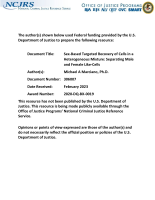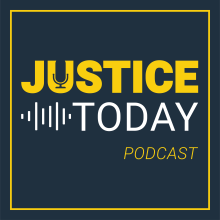Criminal investigation
Sex-Based Targeted Recovery of Cells in a Heterogeneous Mixture: Separating Male and Female Like-Cells
Forensic GIS
Furthering understanding of forensic units: a detailed examination of Knoxville police department's crime scene unit
Identification and Detection of Cosmetics Transferred during Close Personal Attacks
NIJ Awards Over $11 Million to Support Forensic Science Research and Development in 2022
On September 30, 2022, NIJ announced $11.6 million in funding to support 23 projects under the “NIJ FY22 Research and Development in Forensic Science for Criminal Justice Purposes” solicitation. Through its research and development grant funding, NIJ continues to advance the speed, accuracy, and reliability of forensic analysis, which ultimately bolsters the...








